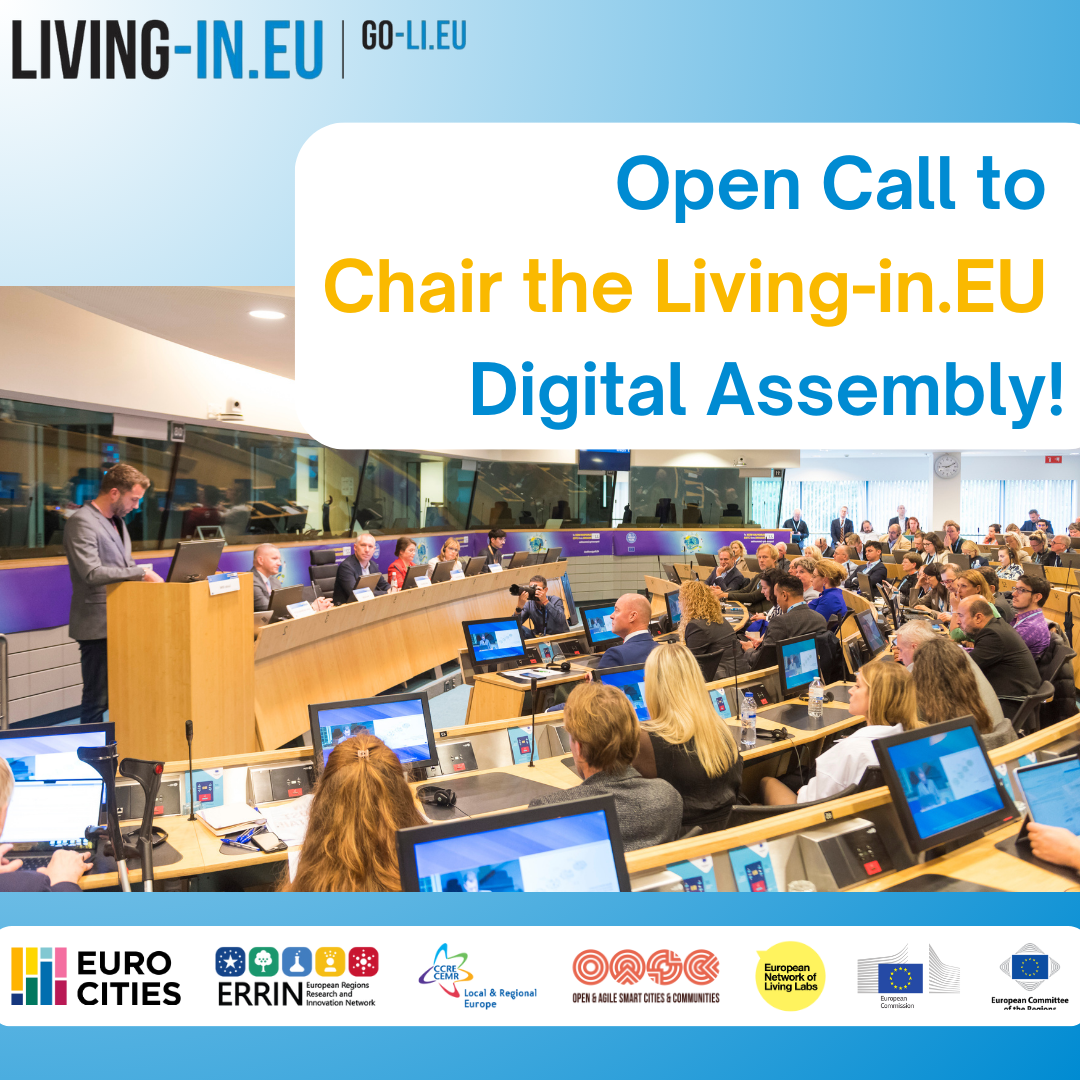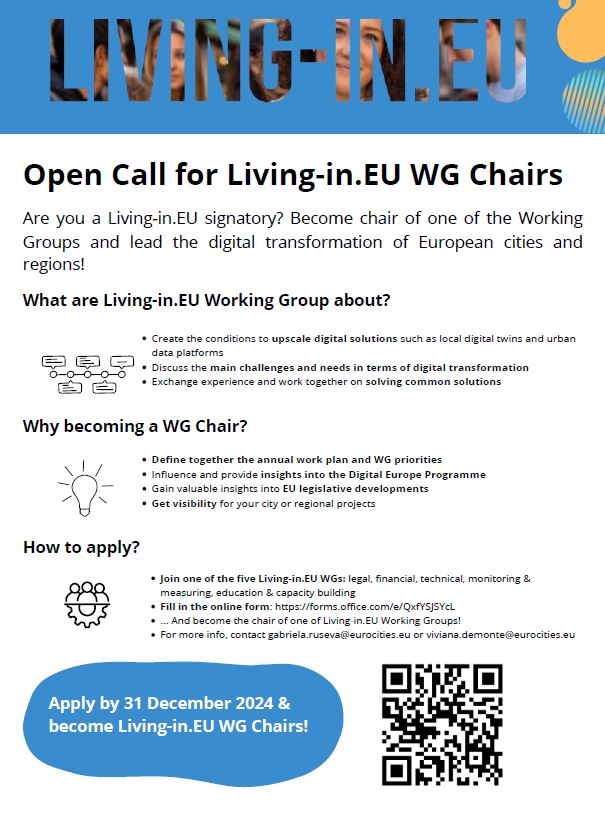As part of the European Week of Regions and Cities 2024, the Living-in.EU Digital Assembly gathered key European stakeholders in Brussels on 9 October to discuss the digital transformation of cities.
The event, which took place in the Jacques Delors building of the Committee of the Regions, provided a platform for EU mayors, local and regional leaders, and stakeholders to discuss political priorities and set a strategic direction for the movement.
"Living-in.EU helped us focus not only on the economic and technological dimensions but also on the social and environmental aspects of digital transformation," said André Sobczak, Secretary General of Eurocities and moderator of the session.
Living-in.EU, connecting cities for a greener and inclusive digital future
This year's event, co-chaired by Mirja Vehkaperä, Chair of the City Board of Oulu, and Lluïsa Moret Sabidó, Mayor of Sant Boi de Llobregat, focused on fostering a people-centred digital innovation ecosystem.
Oulu was the first city to sign the “Join, Boost, Sustain” Declaration. “Oulu has 50 years of experience in radio technology. Every day, close to 3 billion people globally use technology developed in Oulu,” explained Mirja Vehkaperä in her opening remaks. Vehkaperä highlighted Oulu's Smart City 2028 roadmap, co-created with 80 local stakeholders, which focuses on collaboration across sectors, such as academia, industry, and local communities.
Vehkaperä also underlined cities' crucial role in integrating digital transformation with sustainability: “Being chair and an active member in the Living-in.EU family makes it possible to lead the way and be a bridge between EU cities and regions to answer a very relevant question: How can we boost a digital transformation that also boosts green socio-economic transformation?”
Digital inclusion, at the core of the transformation
For Sant Boi de Llobregat, digital transformation must first and foremost be inclusive, said Mayor Lluïsa Moret Sabidó. She stressed that the city is deeply committed to promoting a digital society where people, not technology, are at the centre: "We have always focused on a digital transformation that places digital rights at the forefront, ensuring the people, not the tools, are the priority."
Mayor Moret explained that their digital projects aim to ensure equal access to tools for all citizens, including the most vulnerable: “Not having basic digital skills can prevent access to public services like medical consultations, university education, or job opportunities,” she stated. In Sant Boi, digital inclusion efforts focus on eliminating barriers tied to gender, age, and socio-economic vulnerability, making sure that no one is left behind. “As public administrations that generate equality, we cannot allow this to happen,” she added.
Towards people-centred innovation
“Digital transformation is not just about technology—it is a societal challenge where technology can be embedded,” said Guido Rink, Vice-Mayor of the municipality of Emmen. He warned against the growing influence of large tech companies: “Big tech doesn’t have customers; they have hostages. We need regulation to reverse this situation,” referencing new laws like the Digital Markets Act (DMA) and Digital Services Act (DSA).
Digitalisation is the oxigen that will create opportunities to solve human challenges, only if it’s human centred and based in nature.
- Guido Rink, Vice-Mayor of Emmen
Rink also spoke about the need for public-private partnerships (PPPs) and multi-level governance in Europe, emphasising that bottom-up approaches are essential for accelerating the digital transformation of European cities. "We need to think big, start small, and scale fast”
In addition, Arnis Gulbis, Director of Riga Digital Agency, shared the impact that joining the Living-in.EU movement has had on his city’s digital strategy. “We joined this movement quite recently, but it has given a real boost to our city’s digital transformation. It worked for Riga, and it will work for any other city,” he stated. Riga’s Digital Agency, he explained, brings together academia, private sector leaders, and city officials to improve public services and infrastructure using data-driven decision-making.
Sustained funding for all municipalities
Sophie Valdenaire-Ratto, Delegate for Digital Transformation in the Bourgogne-Franche-Comté region, discussed the critical role of regions in advancing digital transformation, especially by supporting smaller municipalities.
She highlighted the importance of securing European funds to make these initiatives viable: "We help smaller municipalities effectively access European funding." Two key projects in her region focus on cybersecurity and a shared regional infrastructure for data collection, ensuring that even financially constrained areas can participate. "It’s essential to finance territories that can't afford these technologies," she stressed, underlining the need for inclusive regional strategies.
Collaborative digital ecosystems are the way forward
In discussing how to strengthen European cities' digital ecosystems, Martin Bailey, Head of the Artificial Intelligence for Societal Good Unit at the Artificial Intelligence Office of the European Commission, highlighted the importance of investing in infrastructure. “One of the most exciting developments is our EDIC (European Digital Infrastructure Consortium), which mobilises investments to acquire infrastructure,” he said. Bailey also emphasised the importance of ensuring that cities have a direct role in the European Digital Transition, alongside member states.
The Living-in.EU Digital Assembly concluded with a signing ceremony for new and potential signatories of the "Join, Boost, Sustain" Declaration, reaffirming the commitment of cities to a sustainable and inclusive digital future. Mayor Moret highlighted the importance of collaboration: “Horizontal and vertical alliances are essential for a successful digital transition,” she said, calling for partnerships across public, private, and academic sectors, as well as across different levels of government.
Cities leading the way
The Living-in.EU Digital Assembly 2024 showcased how cities and regions across Europe are pioneering a sustainable and inclusive digital transformation. As Vehkaperä concluded, the role of cities is critical: “The role of cities is to keep the movement moving, using the tools we have to help everyone access a digital society.”









